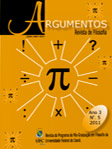Foundationalism: from tradition to moderate theories
Keywords:
Justification. Foundationalism. Infallibilism. Fallibilism.Abstract
Historically epistemology has defined knowledge as universal and infallible. However, tradition has not accounted for solving in a sufficiently satisfactory way the issues posed by skeptics such as the question of existence of an external world outside the mind, the argument from illusion and from error, among others. Consequently, reformulations of the concept of knowledge have been proposed, developing new approaches to Epistemology. Fallibilist theories are found among the new approaches proposed, they defend that knowledge is fallible, and that our beliefs are nullified and in need of revision. This paper aims to describe the foundationalist theory of justification, both in its origin, including the proposed infallibility, as the subsequent reformulation. Foundationalism was one of the first alternatives to the problem of justification of beliefs, but his proposal to halt a epistemic regress to beliefs infallible led to a series of skeptical objections. Consequently, a weakening of this theory was formulated, namely fallibilist theories which argue that knowledge is not universal and irrevocable, but may be revised and improved. In the first part of this paper, presents the issue of epistemic justification and the problem of return of reasons. Posteriorly, explaining the traditional foundationalism, the way it conceived the epistemic regress as well as the objections to it presented. Finally, presents the formulations fallibilist and as they attempt to solve the problems left by tradition. This paper aims to show that fallibilism entails a way of understanding knowledge in epistemology and in so doing recasts concepts such as universality and infallibility.Downloads
Published
Issue
Section
License
Argumentos magazine is licensed under an International Creative Commons Attribution License.
The Magazine uses CC BY inclusion
1) The authors retain the copyright granted to the magazine or the right to initial publication, with the work regularly licensed under the Creative Commons Attribution, which allows the sharing of the work with acknowledgment of authorship and initial publication in this magazine.
2) The authors are authorized to contract additional applicable contracts, for non-exclusive distribution of the version of the work published in this journal (for example, publication in the institutional repository or as a chapter of the book), recognition of authorship and initial publication in this journal.
3) Authors are authorized and encourage to publish and distribute their work online (for example, in institutional repositories or on their personal pages) at any time before or during the editorial process, as they can generate productive changes, as well as increase the impact and reference of published work.




.jpg)










._._3.png)
1.jpg)
._._._.png)
